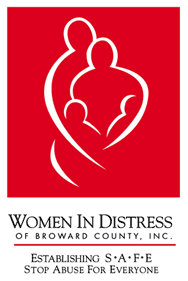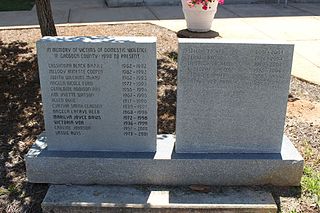
A women's shelter, also known as a women's refuge and battered women's shelter, is a place of temporary protection and support for women escaping domestic violence and intimate partner violence of all forms. The term is also frequently used to describe a location for the same purpose that is open to people of all genders at risk.
The Women's Center & Shelter of Greater Pittsburgh was founded in 1974 in Pittsburgh, Pennsylvania, and provides services for victims of domestic violence. It was one of the first six centers for domestic violence that was established in the United States. The Women's Center works in conjunction with Allegheny County, the City of Pittsburgh, and surrounding municipalities to provide support for victims of domestic abuse.
Calgary Women's Emergency Shelter (CWES) was established in Calgary in 1974. This Shelter serves individuals who experience domestic abuse. The organization was one of the first not-for-profits in Canada, established to provide crisis support for victims of family violence, and prevention programs for the community.
Dating abuse or dating violence is the perpetration or threat of an act of violence by at least one member of an unmarried couple on the other member in the context of dating or courtship. It also arises when one partner tries to maintain power and control over the other through abuse or violence, for example when a relationship has broken down. This abuse or violence can take a number of forms, such as sexual assault, sexual harassment, threats, physical violence, verbal, mental, or emotional abuse, social sabotage, and stalking. In extreme cases it may manifest in date rape. It can include psychological abuse, emotional blackmail, sexual abuse, physical abuse and psychological manipulation. Though most frequently the perpetrator of abuse is a male partner against a female partner, abuse by a female partner against a male also takes place.

The Marjaree Mason Center is a non-profit, shelter-based, domestic violence program headquartered in Fresno, California. Named for an Easton, California woman who was murdered by her ex-boyfriend, the center operates one of the largest shelters in California.
Brevard County, Florida provides a number of unique services to help the aged, juveniles, the physically and mentally handicapped, and minorities.

The National Network to End Domestic Violence(NNEDV) is a 501(c)(3) not-for-profit organization founded in 1990, based in the District of Columbia. It is a network of state and territorial domestic violence coalitions, representing over 2,000 member organizations nationwide. The National Network to End Domestic Violence works to address the many aspects of domestic violence.

Women in Distress (WID) is a nationally accredited, state-certified, full service domestic violence center in Broward County, Florida. WID adopts an empowerment based model. WID provides victims of domestic violence with safe shelter, crisis intervention and resources, and raises community awareness through intervention, education and advocacy. WID works in partnership with the Broward County Sheriff's Office (BSO). At a press conference in October 2009, Florida Governor Charlie Crist commended Women in Distress and Broward Sheriff's Office for their joint efforts to combat domestic violence. Tiffany Carr, the CEO of Florida Coalition Against Domestic Violence (FCADV) said Broward County had been chosen to lead the rollout of Florida's new $1.2 million program to combat child abuse, because the successful partnership between Women in Distress and Broward Sheriff's Office had rapidly exceeded all expectations.
House Of Ruth Maryland is a non-profit organization that was founded in 1977 by a coalition of women's organizations, religious groups, service providers, and elected officials to provide a safe haven for victims of domestic violence and their children. It is headquartered in Baltimore, Maryland, United States and has offices throughout the state of Maryland. House of Ruth Maryland leads the fight to end violence against women and their children by confronting the attitudes, behaviors and systems that perpetuate it, and by providing victims with the services necessary to rebuild their lives safely and free of fear. Funding for House of Ruth Maryland is made possible through private (53%) and government (38%) funds, and other sources (9%) including investment income, training and client fees resulting mainly from the Gateway Project. Since its inception, The House of Ruth Maryland has served over 100,000 victims of domestic violence.
Specialized domestic violence courts are designed to improve victim safety and enhance defendant accountability. They emerged as a problem-solving court in the 1980s and 1990s in response to frustration among victim advocates, judges and attorneys who saw the same litigants cycling through the justice system again and again.
Women's Center of Rhode Island (WCRI) is a domestic violence organization and safe house serving women and children in Providence and East Providence, Rhode Island. Founded in 1974, WCRI is a nationally recognized agency for promoting a violence-free America. WCRI is a member of the Rhode Island Coalition Against Domestic Violence.
The Mongolian Gender Equality Center(MGEC) is a non-governmental organization based in Ulaanbaatar, Mongolia, established in 2002 to fight the growing crime of human trafficking in Mongolia, focusing on protecting young women and girls, the primary group affected.
The Women's Shelter of South Texas was established in 1978 to provide emergency shelter and support for victims of domestic violence. Services expanded in 1993 to include survivors of sexual assault. New facilities were built in 1994 that allows up to 65 clients. In 1995, the Batterers Intervention and Prevention Program (BIPP) was established. In 1987 the agency expanded to provide services to rural areas in Alice, Beeville, Kingsville, and Sinton. The Shelter wants to include offices and a full staff in each location. The organization continues to educate and prevent sexual assault in South Texas.

Domestic violence in United States is a form of violence that occurs within a domestic relationship. Although domestic violence often occurs between partners in the context of an intimate relationship, it may also describe other household violence, such as violence against a child, by a child against a parent or violence between siblings in the same household. It is recognized as an important social problem by governmental and non-governmental agencies, and various Violence Against Women Acts have been passed by the US Congress in an attempt to stem this tide.
The following outline is provided as an overview of and topical guide to domestic violence:

The management of domestic violence deals with the treatment of victims of domestic violence and preventing repetitions of such violence. The response to domestic violence in Western countries is typically a combined effort between law enforcement, social services, and health care. The role of each has evolved as domestic violence has been brought more into public view.

Safe Horizon, formerly the Victim Services Agency, is the largest victim services nonprofit organization in the United States, providing social services for victims of abuse and violent crime. Operating at 57 locations throughout the five boroughs of New York City. Safe Horizon provides social services to over 250,000 victims of violent crime and abuse and their families per year. It has over 800 employees, and has programs for victims of domestic violence, child abuse, sexual assault, and human trafficking, as well as homeless youth and the families of homicide victims. Safe Horizon's website has been accessible for the Spanish-speaking population since 2012. Safe Horizon has an annual budget of over $63 million.
Harbor House of Central Florida is a non-profit state-certified domestic violence shelter near Orlando, in Orange County, Florida. Harbor House operates a 24-hour crisis hotline, and provides counseling and a 110-bed safe shelter for women, children and men. Its activities include community outreach, legal advocacy services, and community and professional education.

Womankind, formerly known as the New York Asian Women's Centre (NYAWC), was founded in 1982 by a group of volunteers led by Pat Eng. In 2017, the NYAWC changed its name to Womankind. It is a non-profit organization which aims to empower Asian survivors of gender based violence. Womankind was initially a community awareness program designed to educate families about domestic violence in Chinatown, and then developed into a 24-hour multilingual hotline that now includes 18 different Asian languages and dialects. Womankind also provides Asian immigrant women confidential services including an emergency refuge, shelter services, crisis counseling, 24-hour online free multilingual hotline, welfare promotion, support groups, parenting workshops, children's services, volunteer training, community education, and some English courses. Each year, the organization receives over 3,000 hotline calls.

Domestic violence in South Korea is the mental, physical, verbal or sexual abuses or crimes of violence committed towards a victim in a domestic setting of marital relations and cohabitation. Domestic violence describes violence towards a domestic partner, towards children and between siblings. According to the Domestic Violence Survey of South Korea in 2010, elder abuse was estimated to be 10%, physical abuse accounted for 2.2%, emotional abuse 9%, economic abuse 1.2%, and neglect 2.5%. Marital violence has been the most prevalent form of family violence in South Korea. One out of six couples in South Korea had more than one episode of physical violence from their spouse.







